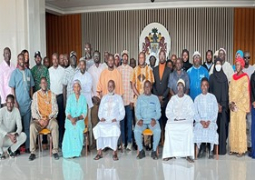“CSOs are very important pillars in the country, and there's a need for the government to engage them in terms of budget policies among other issues. When the government is developing budgets and policies and laws, CSOs should be at the centre because they represent the population,” he said.
Mr. Gaye was speaking on Wednesday during a forum organised for CSOs and the Media at a local hotel in Senegambia.
The convergence, organised by the MOFEA in collaboration with the UNDP, is aimed at increasing CSOs and Media awareness on government institutions’ response to Covid-19 on the theme: “The Impact of Covid-19 on the Gambian Economy.”
According to Mr. Gaye, if CSOs are not consulted, most of the decisions taken would not be very ‘legitimate’ in terms of representing the interest of the citizenry themselves. “However, we have been engaged in the policy process for the last two years and I think this is a very good sign that the government is open to be more democratic in The Gambia and to make sure that the citizenry voices are being heard”.
“We as CSOs are honoured to partake in this important session. We want to applaud the Ministry of Finance for always engaging the CSOs for the last three years since the advancement of New The Gambia. We have seen changes in terms of government engagement with the civil societies which did almost not exist during the former regime.”
“We want to encourage the Ministry of Finance to continue on that path. The Gambia is shared by all. We have the legislature, executive and the judiciary. But we also have the fourth estate which is not just the media which of course is often referring to, but it also includes the citizenry which of course is led by the CSOs.”
“We are talking about the Covid-19 responses. We expected that the government through the Ministry of Finance and the Ministry of Health would have involved the CSOs since March and April. It’s unfortunate that this doesn’t happen and we don’t expect it like that. We wanted to mention it here so that we don’t repeat that error again. A lot of CSO’s were not happy when we were not involved and in the way things happened last year.”
For her part, Juldeh Ceesay, deputy permanent secretary at MoFEA, said since the country recorded the first case of Covid-19, the MoFEA and the Ministry of Health and its partners and other government institutions instituted several measures in the fight against the virus in order to save lives and livelihood.
“Given the role of CSOs and the media in driving government effort and the significant step taken in the sensitisation of the general public, it is therefore pertinent to share your experience to consider and review critically and come up with suggestions to take decision that will eventually improve CSOs and Media engagement with government for national development.”
Lamin Jawla from the Ministry of Health, in presenting a paper on the Health Impact of Covid-19, said Covid-19 itself can lead to neurological and mental complications, such as delirium, agitation, and stroke.
He said: “People with pre-existing mental, neurological or substance use disorders are also more vulnerable. They may stand a higher risk of severe outcomes and even death.”
The Covid-19 pandemic, he went on, has led to a dramatic loss of human lives worldwide, adding that it presents an unprecedented challenge to public health, food systems and the world of work.
“The economic and social disruption caused by the pandemic is devastating. Many people are at risk of falling into extreme poverty and undernourished.”
Read Other Articles In Headlines

Gambia validates national REDD+ roadmap to tackle forest loss, climate change
Dec 24, 2025, 1:42 PM




